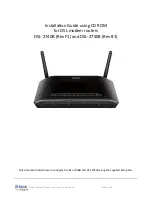
2-7
ACFP client information
ACFP client information contains the following:
z
ACFP client identifier. It can be assigned by the ACFP server through a collaboration protocol or
specified by the network administrator to ensure that each ACFP client has a unique client ID on
the ACFP server.
z
Description: ACFP client description information.
z
Hw-Info: ACFP client hardware type, version number, and so on.
z
OS-Info: System name and version number of the ACFP client.
z
App-Info: Application software type and version number of the ACFP client.
z
Client IP: ACFP client IP address.
z
Client Mode: Working mode currently supported by the ACFP client, namely, the combination of
the host, pass-through, mirroring, and redirect modes.
ACFP collaboration policy
ACFP collaboration policy refers to the collaboration policy that the ACFP client sends to the ACFP
server for application. The policy information is as follows:
z
Client ID: ACFP client identifier.
z
Policy-Index
z
In-interface: Interface through which the packet is sent to the ACFP server.
z
Out-interface: Interface through which the packet is forwarded normally.
z
Dest-interface: ACFP server interface connected with ACFP client.
z
Context ID: It is used when the packet is mirrored or redirected to an ACFP client. After the
interface connected to the ACFP client is specified in the policy sent, the ACFP server assigns it a
global serial number, that is, the Context ID, with each Context ID corresponding to an ACFP
collaboration policy.
z
Admin-Status: It indicates whether to enable the policy.
z
Effect-Status: It indicates the expiration time of the policy and is used to control the expiration time
of all the rules under the policy.
z
Start-Time: It indicates starting from what time (second/minute/hour) the policy takes effect and is
used to control starting from what time all the rules under the policy take effect.
z
End-time: It indicates starting from what time (second/minute/hour) the policy turns invalid and is
used to control starting from what time all the rules under the policy turn invalid.
z
DestIfFailAction: If the policy dest-interface is down, the actions to all rules under the policy will be
as follows: for forwarding first devices, select the delete action to keep the redirected and mirrored
packets being forwarded; for security first devices, select the reserve action to discard the
redirected and mirrored packets.
z
Priority: It indicates the priority of a policy, number notation, in the range of 1 to 8. The bigger the
number, the higher the priority.
ACFP collaboration rules
ACFP collaboration rules refer to the collaboration rules that the ACFP client sends to the ACFP server
for application. There are three types of collaboration rules:










































